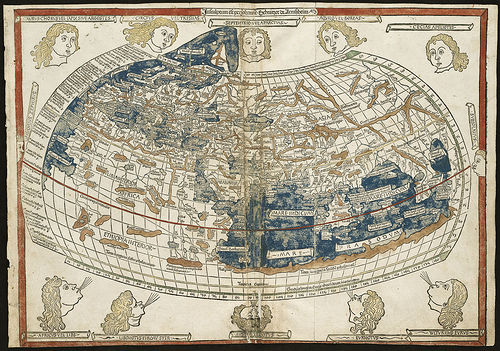Every person takes the limits of their own field of vision for the limits of the world. – Arthur Schopenhauer

The world, flattened. Europe is in NW corner, the northern half of Africa is in the SW section. Arabia in in the center, with Asia taking the rest of the map (at least up to the edge of India). Note the land based boarders around most of the map, and all the divine windbags around the perimeter. The map dates from the late 1400's, after Henry the Navigator, but his maps were considered Top Secret, and not made public for quite a while.
What does that mean?
We all have our limits. For some, their limit is in the seeing, for others, it’s in the doing. Still others have limits built into their thinking, or their ability to believe.
This is neither an accusation nor a problem, unless you let it become so. It becomes a problem when we start rejecting the facts before us because they differ from our vision, because it pushes against our limits. It’s a problem when we stand by our limits when others can see more than we can, can do more than we can, can think better than we can, or believe in something we cannot. It’s even worse when we try to hold others back because our vision is so limited, that we try to limit the world, and everyone else, to that view.
Why is expanding your vision important?
Everyone sees, does, thinks, and believes a little bit differently. These are some of the ways we define and set how we understand the world. If two people saw the exact same phenomenon, they could still come to different conclusions.
For an example, a priest and a scientist are walking and observe a bright light come down and hover near them and then disappear. The priest is more likely to be looking for a miracle, while the scientist will be more likely to be looking for ball lightning or other rare, but scientific explanations.
I didn’t select those two to start a flame war, but to point out that they both (as simple stereotypes) have their limited view of the world. The scientist doesn’t believe in things he cannot verify, and the priest tends to believe easily. For both, it’s a blind spot in their vision, and can be a problem if they are not aware and careful about it.
Like the two in the trivial example above, we all project our blind spots (as well as our clear vision) onto the world we perceive. That’s understandable and quite simply, human. The trick, I believe, is to understand our own weaknesses and our blind spots and work to, if not eliminate them, at least make allowances for them, and to allow others to do the same.
Where can I apply this in my life?
Of the great explorers, Christopher Columbus, was willing to move past the limited vision of nearly everyone before him. While Henry the Navigator discovered much, he stayed well away from the ‘edges of the world’, and missed his chance to cross the Atlantic Ocean and add the lands on the other side to his great list of accomplishments.
Quite simply, Henry and his crews were afraid of falling off the edge of the world. They literally were afraid that there was a point where the earth ended and you fell off. Despite science backing a round earth dating back to the Ancient Greeks. Today we laugh, and call insult people who are backwards thinking by calling them members of the ‘Flat Earth Society.’
The problem comes when people try to force their vision on someone else. Usually it’s a more limited vision being forced on those who see more, but not always. Note that I differentiate between trying to convince someone (perhaps by arguing with them) and forcing them to accept someone else’s vision (which is usually only done by people with power, whether it’s the scientific community, the religious community, or the government).
What are the limits of your field of vision? What can’t you see, do, think, or believe because you already know better? Where does this blindness hurt you? Where to others push against your vision? While it’s easy to blame everything you don’t like on someone else, you might consider that, in some cases, they might be the ones who see more clearly, and with fewer limits.
This doesn’t really have a formal exercise, but it does invite regular self-examination and investigation. You might want to make a list of areas where you and others have disagreements that don’t seem to be settled by simple logic. That’s a clue you have a different vision of the topic.
It might be prudent to take a little time and investigate their claims and see if it might not be you who is in need of an adjustment. After all, we’re all part of everyone, right?
From: Twitter, @ninagarcia
confirmed at : http://www.brainyquote.com/quotes/quotes/a/arthurscho107091.html
Photo by Norman B. Leventhal Map Center at the BPL







Pingback: The Spirit of Rwanda | #africamp
Well He was wrong with his assessment. There is no limit in the world, nor in the universe. Imagination and dreams can be infinite.
Thanks for stopping by and for leaving a comment. However, I have to disagree with you.
The universe may be without limits, but we as humans have limits. Some are physical, others are held only within ourselves. Your inability to see that only proves my point.
Reblogged this on FILOSOFISK.